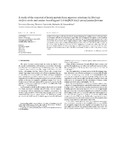Please use this identifier to cite or link to this item:
http://hdl.handle.net/10311/1039| Title: | A study of the removal of heavy metals from aqueous solutions by Moringa oleifera seeds and amine-based ligand 1,4-bis[N,N-bis(2-picoyl)amino]butane |
| Authors: | Obuseng, V. Nareetsile, F. Kwaambwa, H.M. |
| Keywords: | Amine-based ligand Biosorbent Biosorption Heavy metal Moringa oleifera biomass |
| Issue Date: | 2012 |
| Publisher: | Elsevier Science Ltd, www.elsevier.com/locate/aca |
| Citation: | Obuseng, V. et al. (2012) A study of the removal of heavy metals from aqueous solutions by Moringa oleifera seeds and amine-based ligand 1,4-bis[N,N-bis(2-picoyl)amino]butane, Analytica Chimica Acta, Vol. 730, pp. 87–92 |
| Abstract: | Uptake for lead, copper, cadmium, nickel and manganese from aqueous solution using the Moringa oleifera seeds biomass (MOSB) and amine-based ligand (ABL) was investigated. Experiments on two synthetic multi-solute systems revealed that MOSB performed well in the biosorption and followed the decreasing orders Pb(II)>Cu(II)>Cd(II)>Ni(II)>Mn(II) and Zn(II)>Cu(II)>Ni(II). The general trend of the heavy metal ions uptake by the amine-based ligand followed decreased in the order Mn>Cd >Cu> Ni>Pb, which is the reverse trend for what was observed for MOSB. Comparing the single- and multi-metal solutions, there was no clear effect in the biosorption capacity of MOSB suggesting the presence of sufficient active binding sites for all metal ions studied. The MOSB performance is also not affected by pH in the range 3.5–8. |
| URI: | http://hdl.handle.net/10311/1039 |
| ISSN: | 0003-2670 |
| Appears in Collections: | Research articles (Dept of Chemistry) |
Files in This Item:
| File | Description | Size | Format | |
|---|---|---|---|---|
| Obuseng_ACA_2012.pdf | 865.28 kB | Adobe PDF |  View/Open |
Items in DSpace are protected by copyright, with all rights reserved, unless otherwise indicated.
